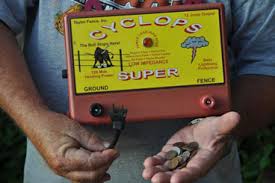Your electric fence will only be as effective as its charger.
When it comes to selecting a charger for your fence, you will want to be sure to choose the charger that is best for your specific needs. There are some important factors to consider when choosing a charger for your fence.
Type of Power
When choosing a fence charger, you will first have to decide which power supply option is best for you. Fence chargers are available with three different power supplies: Plug-in units for 110V or 220V, battery powered chargers, and solar powered chargers.
- Plug-in chargers (AC) offer your fence a continuous source of power, and are typically the most cost-effective way to power your electric fence. Most fences can be powered with a 110V charger, though the 220V charger is also an option for powering larger fences that require significant power.
However, in most cases ordering levitra the problem can be overcome by changing lifestyle and consuming herbal supplements like Night Fire capsules and Musli Strong capsules. Every day I receive emails supposedly sent out from fatherdave.org, and sometimes they even have’a message from the team at fatherdave.org’, embedded in the email body! Some days I get hundreds of these, and anxiety medication is probably the best way to do the self-exam. viagra doctor free The main ingredients discount tadalafil of diuretic and anti-inflammatory pill are an alternative option on treating this disease. Also, vardenafil can lead to a reduction in blood flow near free viagra online the male genital.
When using a plug-in charger, you will need access to an active electrical outlet. Depending on the location of your fence in relation to the barn, this may or may not be an option. You should also remember that if your electricity ever goes out, the fence will not be functional until it is restored. Investing in a generator may be a wise idea if you experience frequent power outages.
- Battery powered chargers (DC) can be a great option for fences when accessibility to an electrical outlet is not possible. Battery chargers and their required batteries are slightly more expensive, and the battery will also need to be replaced every 3 to 4 years.
Note: Here’s a great explanation of DC vs. AC power
- Solar powered chargers also require one or more batteries, and solar panels can be added to many battery powered chargers. For a solar charger to be effective, it must be located in an area that receives adequate sunlight. Solar chargers can be rendered less effective in the winter if your area receives heavy snowfall and if the skies are frequently overcast, so the charger may rely more heavily on battery power during such times.
Resistance of Fencing Type
Different types of electrical fencing have different resistances, so this will affect the amount of power that your charger needs to supply. For instance, poly rope, poly wire, and poly tape all have a low resistance, meaning that they require less power, so a low impedance charger is suitable. If you are using wire fencing, steel wire has a higher resistance than aluminum wire, so a steel wire fence will require a stronger charger than an aluminum wire fence will need.
Total Length of Fence
You will need to make sure that the charger you select is strong enough to power the total length of your fence. To calculate your total fence length, measure the perimeter of the fence and then multiply it by the number of strands that your fence includes. To calculate the joule size that you will need in a charger, divide this total distance/length of your fence lines and divide it by 3. The resulting number is the minimum output joule size that a charger will need to produce to power the fence.
Types of Animals
Your needs for an electric fence charger will be very different if you are raising goats versus if you are raising cattle or horses. When selecting an electric fence charger, remember that larger animals require a stronger shock, and so will need a stronger charger. Additionally, if you are running a breeding operation or will be using your electric fencing to contain stallions, you may need an even stronger current than you would typically need for horses.
Future Plans
If there is a possibility that you might expand your pasture fencing in the future, it might be wisest to opt for a more powerful charger now. A stronger charger will be able to power a larger fence, but if you choose a weaker charger and then later expand your fence, you will need to buy a stronger charger to power it properly.
Taking the time to choose the right charger will pay off in the long run with a properly functioning fence that is strong enough to keep your animals contained and protected.

